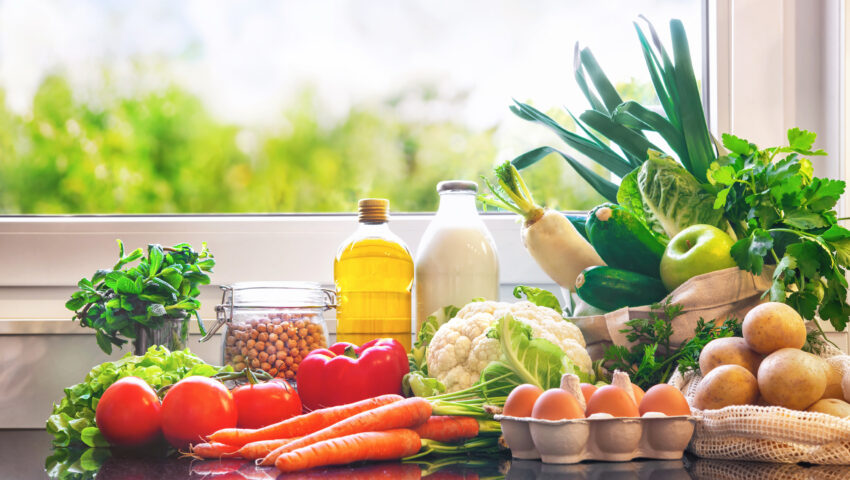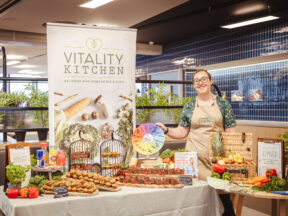Blogs
What is a Healthy and Sustainable Diet?

Sustainability is defined as “meeting the needs of the present without compromising the ability of future generations to meet their own needs”.
Currently, our eating habits are having an immense impact on the environment and our planet such as the effects of global warming which we are experiencing this summer.
What is a healthy and Sustainable Diet?
A diet that balances nutrition, health, economic and cultural considerations whilst having a low impact on the environment.
It’s important for us to adopt a healthy balanced and sustainable diet where we can as it doesn’t just protect our planet but can also protects us by reducing our risk of developing certain diseases such as Type 2 Diabetes, Heart disease, and Cancers, such as Bowel Cancer.
Unfortunately, there isn’t a ‘one size fits’ solution to adopting such a diet, therefore it’s key to concentrate on the small changes you can make as they will make a big impact on both our health and our planet.
My 5 Top Tips
Adopting the below tips will help your diet become not just environmentally friendly but nutritious too!
Reducing your red meat consumption.
- The UK recommendation is to consume no more than 70g or less. Reducing the amount of red meat also reduces the amount of saturated fat and salt which have been found to have a detrimental effect on our health whilst having a lower environmental impact.
- Try to include a meat-free day once or twice a week- remember, small changes can lead to big impacts.
- Include more plant-based sources of protein in your meals such as beans, lentils, nuts, and seeds. My favourite way of doing this is by replacing half the meat in my family’s favourites such as chilli, spaghetti bolognaise, etc with a plant-based protein source! It’s just as delicious and doesn’t ruin the integrity of the dish, plus usually, no one notices…
Purchasing sustainable proteins.
- When in the supermarket and purchasing animal proteins look for their welfare labels, such as Organic, RSPA, Free Range, etc.
- For example, when purchasing fish check the packaging for the MSC logo, this makes sure the fish are caught sustainably and aren’t on the fish to avoid list.
Moderate your dairy intake
- Choose lower fat versions where possible that have been fortified with Calcium and Vitamin D.
Aim to consume your 5ADAY.
- It is recommended in the UK that we consume at least 5 portions (80g per portion) of fruit and vegetables daily as a part of a healthy balanced diet.
- To ensure that the fruit and vegetables you are purchasing are sustainable, why not try…
- Purchasing local and seasonal produce- not only is it better quality but it’s also more nutritious.
- Visit your local farm shop or pick your own, which also helps your local economy!
Bonus point – if you can, walk or cycle to and from the farm or locally to help reduce carbon emissions from driving.
- Avoid purchasing fruit and vegetables that have been pre-prepared or packaged to reduce the use of single-use plastic.
To check out what fruit and vegetables are currently seasonal in the UK, visit the following link: Seasonal fruit and veg – a handy guide
- Try to reduce your waste.
Food waste is one of the biggest environmental issues with ¼ of the food we purchase not being used and going to landfills. Try out the following ways to help;
- Plan your meals for the week ahead- this way you are only purchasing what you need.
- Keep an eye on the use-by date, if it’s getting close to the date, cook it and pop it in the freezer for a later date.
- Instead of disposing of any leftovers, get creative in the kitchen and recreate a delicious meal you can have for lunch the next day.
Monthly Challenge:
Bring a reusable water bottle or coffee mug to work or on the weekend outings to help reduce the amount of disposable/single-use plastic being used.
BM is doing their part too… we have some exciting popups that could be coming to your restaurant. Keep a look out for Waste-ed or EWTEIM!
You can listen to my podcast about a sustainable diet here:
Further reading and resources.
https://www.un.org/en/academic-impact/sustainability





